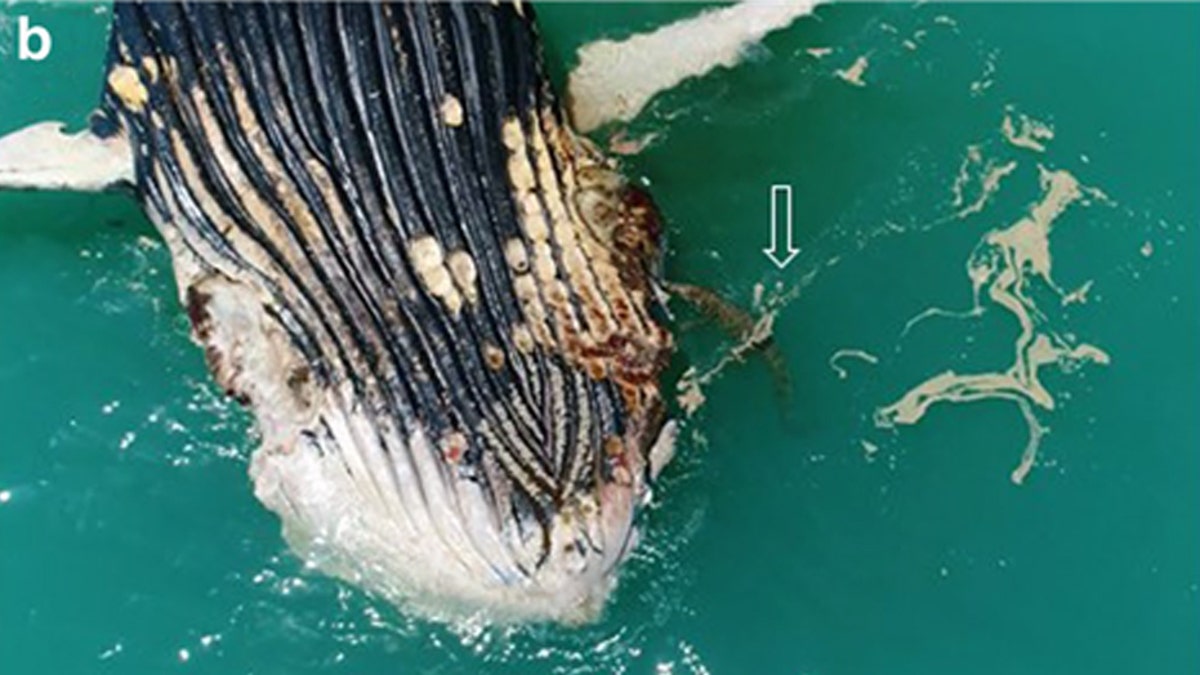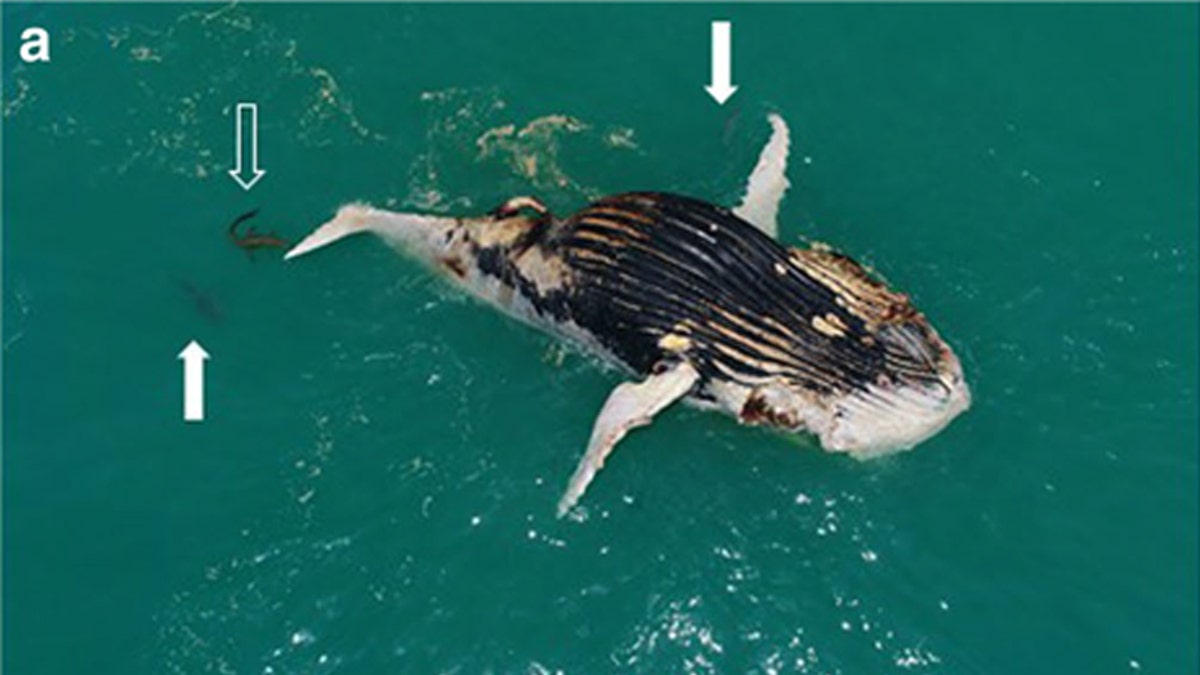
Sharks and a saltwater crocodile went on a feeding frenzy about a mile off the coast of Western Australia. (Courtesy Dr. Austin Gallagher/Journal of Ethology)
Sharks and a saltwater crocodile went on a feeding frenzy about a mile off the coast of Western Australia — and the "rare" event was caught on tape.
A drone captured the predators feasting side by side on a roughly 50-foot humpback whale carcass floating near a sandbar off Montgomery Reef.
It is believed to be the first time sharks and a croc have been documented foraging together.
Dr. Austin Gallagher, chief scientist and CEO of Beneath the Waves, a Washington, D.C.-based non-profit organization working to protect the world's oceans, said he's been studying sharks for more than a decade but he'd never seen anything quite like this.
"It's very rare to actually see these two groups of animals overlapping," Gallagher told Fox News on Thursday.
"Every minute is life or death for animals in the wild ... So to see croc get out there and get into mix is pretty impressive. It shows how valuable free food is to a top predator."
The shark expert spotted the video, posted by an Australian charter company, on Facebook back in September. Since he has studied the scavenging of whales in the past ‒ which, he notes, is an "important part of their ecosystem" ‒ Gallagher decided to do some research.
He reached out to the charter company to get more details about the encounter and recruited two colleagues to help investigate. The researchers then wrote about their observations in a paper, which was recently published in the "Journal of Ethology."
"Sharks are a difficult group of organisms to study. They move around quite a bit, they're large, they're dangerous to work with and the concealing nature of the ocean environment makes studying them really challenging," Gallagher said. "But sometimes these really unique instances occur — and we learn a lot of information in a short period of time."
A rotting whale carcass creates a huge pulse of odors and fumes that species like sharks can easily pick up on. The predators have a "renowned" sense of smell, Gallagher says, and the dead creature can bring in animals from hundreds of miles away.

A crocodile joined four tiger sharks as they feasted on a dead whale in Australia. (Courtesy Dr. Austin Gallagher/Journal of Ethology)
"Up to 40 great whites have been seen at once on one carcass," Gallagher said.
In this case, there were only four tiger sharks and one 13-foot crocodile spotted eating the whale, though hundreds of teeth marks on the whale's body suggest there were likely even more.
Thanks to Australia's "dramatic tidal cycles," the whale was swept in closer to shore — within range of the croc, which traveled about 3,280 feet to reach the meal.
"Every minute is life or death for animals in the wild, something we forget as humans. So to see croc get out there and get into mix is pretty impressive," Gallagher added. "It shows how valuable free food is to a top predator."
When it comes to scavenging whale carcasses, sharks are typically pretty laid back. They all get a chance to feast, though Gallagher says there is occasionally a pecking order based on size.
"They usually play nice with one another. There's enough food to go around and a lightbulb goes off, 'It's good for me, it's good for everybody — let's just do this,'" Gallagher said.
But when the crocodile encroached on their meal, at least one of the sharks didn't seem to have that mentality.
"A tiger shark made brief contact with the crocodile, appearing to splash the water with its tail, likely in an effort to deter the crocodile from the region," the study reads. "After this interaction, the shark quickly abandoned the region, after which the crocodile buried its head into the cavity of the whale, presumably in an effort to find more desirable pieces of flesh."
"These are apex predators, and as impressive and incredible as they are, our top predators are in trouble and they're threatened."
Gallagher said the croc seemed relatively unphased by the interaction, crawling onto the pectoral fin between feeding bouts. If the shark did end up agitating the croc, it's unclear what would have happened.
"It's impossible to know who would win in that battle for sure. I would say that would be a fight that a shark wouldn't want to engage with ... a croc has pretty tough skin," Gallagher said.
It's important to study the behaviors of top predators, which keep the ecosystem healthy, Gallagher said. He realizes this particular case may not result in protective measures, but he hopes it creates a spark of inspiration.
"These are apex predators, and as impressive and incredible as they are, our top predators are in trouble and they're threatened," he warned. "They're experiencing declines worldwide. It's my hope that these fascinating reports can inspire people to want to become advocates for their protection."




















